How to misrepresent Adam Smith: review of P. J. O’Rourke’s ‘On the Wealth of Nations’
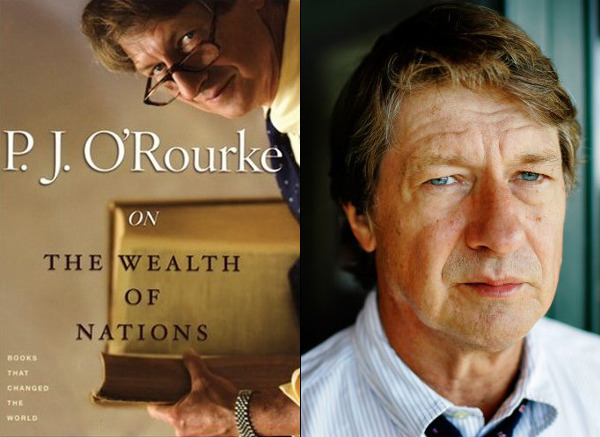
I don’t know if you’re familiar with P. J., but he’s an excellent writer, and he’s extremely, acerbically funny. With this book, as with his Give War a Chance, several times he made me spit my tea out and have to stop to wipe tea off the page.
The United States imports a great deal more than it exports, due in large part to the China trade. At my house I see a MADE IN CHINA label on everything but the kids and the dogs. And I’m not sure about the kids. They have brown eyes and small noses.
You don’t expect that when you’re reading a book on economics, so it takes you by surprise. And he has a way of putting things that, although obvious, get you to see it that way for the first time:
Most of the eighteenth century’s information about democracy was more than two thousand years old.
Political writers aren’t usually so entertaining (God, if only). Yes, at the time Adam Smith was writing, Americans were trying to do something, the like of which hadn’t been tried for over 2000 years. But it wasn’t, isn’t, and never has been democracy. As with the Greeks, the founding fathers had slaves, women had no say, and by the time universal suffrage arrived in America, the political system had already been bought.
The problem with P. J. is that as a political philosopher, he’s not very good. He rails against socialism, communism and state control generally as if that’s the only alternative to a corporate-run, unsustainable capitalism. Worse than that, he writes as if he doesn’t even understand that capitalism is undemocratic or unsustainable, and he specifically states that politics and economics are separate in modern capitalism. Pull the other one, P. J.
P. J.
Communism is an easy target, and his remonstrations against a now-impotent enemy soon gets boring. His conception of politics is simple and binary. If it’s not full-on corporate capitalism, it must be socialism. The best thing I can say about P.J. is that he doesn’t have a clue what’s going on. That’s the best thing I can say, because if he really did understand, you’d have to question his compassion and/or his integrity.
Smith certainly understood the nature of power more than P. J. does. Even the meaning behind the Smith quotes that he chose for his book he doesn’t quite get. Smith says, for example:
Our merchants and master-manufacturers complain much of the bad effects of high wages in raising the price … of their goods both at home and abroad. They say nothing concerning the bad effects of high profits. They are silent with regard to the pernicious effects of their own gains. They complain only of those of other people.
That’s more like it. And:
The government of an exclusive company of merchants is, perhaps, the worst of all governments.
And:
Those exertions of the natural liberty of a few individuals, which might endanger the security of the whole society, are, and ought to be, restrained by the laws of all governments.
Smith’s name is used nowadays to relentlessly support the philosophies of neoliberal, corporate capitalism, yet it’s clear from reading his words that he would have despised it. P. J. never writes anything to indicate that he understands that.
It goes deeper, actually. At one point P. J. says:
Politics is unreceptive to the obvious and simple system of natural liberty. Imagine the politician who stood on the hustings and said, ‘Oh, do what you want.’
I’d say great, but it has to be more than that. This is where right-libertarians miss the point. ‘Do what you want’ is the easy bit. There’s a more difficult part, and it’s, ‘…but don’t hurt anyone else’. That’s much more difficult to achieve, and that’s what the political conversations are about, and why P. J. doesn’t understand them. He needs to go that extra step. The alternative doesn’t have to be state power – either communist or fascist. But it has to be something, because you can’t have democracy when everyone is free to make as much money as possible, because wealth concentrates – it always has and it always will.
Democracy
P. J. correctly points out why, from the Agricultural Revolution until relatively recently, power has always been associated with land ownership. The reason is that the more land you have, the more thugs you can feed. Again, I’d never thought of it like that. He says:
This did not mean jesters and jousts and throwing chicken bones on the floor of the Medieval Times restaurant chain. It meant feeding thugs. The more thugs a chieftan could feed, the more powerful he was.
And he’s right. Land is a finite resource, and so power was a zero-sum game. However, now that capitalism has changed the rules, and power resides with money rather than land, P. J. believes that the total amount of money, and therefore the total amount of power available, is infinite. He put it this way:
By turning power into money instead of real estate, capitalism made power infinite and began the process of separating economic power from the power to dominate fellow humans.
Leaving aside the fact that money is only as good as the things it can buy, and on a finite planet, the things it can buy are also finite (let’s not have the ‘services’ argument here – just think about how you’re going to stop the income from the service sector being spent on material things), including, ironically, land – if you think that the power of money can’t be used to dominate fellow humans, there’s no hope for you. Among all the inanities and straw men in the entire book, I think that this point is the one that illustrates his lack of understanding of the true nature of power the most.
Ecology
Ecological collapse is coming, it’s real, and we shouldn’t be afraid to say it in case we upset people. This isn’t an argument for the masses. You could eat babies in front of the majority of people and as long as they can have their bacon sandwiches and watch football, they don’t care. Everybody knows how we keep animals, who makes their clothes and what we’re doing to nature. You’d have to go out of your way to avoid knowing about those things. But they don’t care, and there’s nothing we can do about it. We need to stop avoiding the main issue – the fact that ecology is collapsing – so as not to upset the masses. Even if the masses were listening, what do you want them to do – vote Labour or Democrat? Separate their recycling? What, exactly? This is an argument for the people who get it and who care enough to want to do something about it. If change is going to come, these are the people who are going to deliver it, not the masses. We don’t need to sugar-coat anything. Let’s tell it like it is.
But if you’re a writer, and you’re not talking about the coming collapse, you’re not talking about anything. The interesting conversations begin once we accept that ecological collapse is on the way. It doesn’t have to be front and centre all the time – it’s right to point out that that would be too depressing. But it has to be at the back of everybody’s minds, and at the front of some. We need to be moving in the right direction. And that’s not a capitalist direction, P. J. – that’s for sure. The masses will take the path of least resistance, but political thinkers need to address this or stop wasting our time with self-indulgent nonsense.
And if you’re one of those people whose attitude is ‘fuck humanity’, then your personal enlightenment isn’t important. It’s only important in the service of humanity. Otherwise, fuck your enlightenment.

Smith
Smith, of course, had no idea what we’d be doing to nature by the 21st century, and at that time, there was some sense in calling for growth as a panacaea for the ills that prevailed. Now, calling for perpetual growth in the West, in the face of ecological destruction, tedium and obesity, and refusing to acknowledge the evidence of ecological damage or its association with growth, indicates a lack of either intelligence or integrity.
But self-interest is at the heart of Smith’s philosophy, and everyone pursuing their individual self-interest will benefit nobody in the end. You can’t compete for happiness, and you can’t ultimately have a happy, satisfying life if other people have unhappy, unsatisfying lives. They will spoil your happiness, one way or another. We have to pursue happiness at the community / neighbourhood level, or it won’t really be self-interest at all. We have to move towards a mutualist society, not one based on individual interests. Having said that, if you want to duck out of it and be completely independent, that should be up to you. I’d suggest that you’d be missing out on a lot of life, but I certainly wouldn’t want to stop you doing it.
At the other end of the scale, humans aren’t equipped to relate to each other in their billions. Neighbourhood / community is the appropriate level for human relationships. To create entities with wider coverage, we have to network groups based in communities – to network the neighbourhoods, rather than impose political entities from above. In that, I think that P. J, Smith and I might agree. It certainly tallies with conservative Edmund Burke’s ‘little platoons’. But it’s in the co-ordination of these platoons, to the detriment of state or corporate power that the real key to change lies.
Elections involving hundreds of millions of people don’t produce good leaders. To find good leaders (and leaders are necessary, co-ordinated platoons or no; decisions still have to be made – decisions way beyond the understanding of the majority), we have to meet them, and judge them in terms of intelligence, compassion and integrity. Only through face-to-face contact in our communities can we do that. Control has to be networked right out to communities, not concentrated in decision-makers who have never met the vast majority of people they represent, or worse, decision-makers who have been appointed above the heads of the people, or worse still, decision-makers who achieve their position because of their wealth.
I like reading P. J. O’Rourke. I always feel entertained. But not understanding the effect that corporate capitalism has on ecology and democracy is unforgivable, and renders him utterly irrelevant. Good writing isn’t enough. We need better thinking than this if we’re going to move towards a sustainable, democratic system, and to that, there really is no alternative.
The views expressed in our blog are those of the author and not necessarily lowimpact.org's




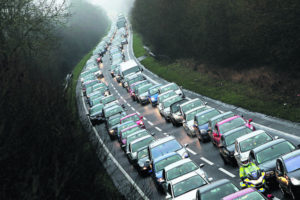 Is modern life a mistake?
Is modern life a mistake?
 Is democracy obsolete, and can we ever achieve it as long as we have to keep feeding ‘the beast’?
Is democracy obsolete, and can we ever achieve it as long as we have to keep feeding ‘the beast’?
 How money causes poverty (plus war and ecological destruction), and what could replace it
How money causes poverty (plus war and ecological destruction), and what could replace it
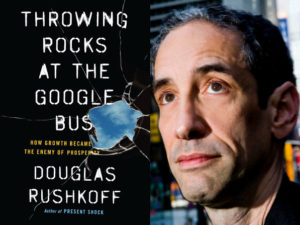 It’s worse than you think: review of Douglas Rushkoff’s ‘Throwing Rocks at the Google Bus’
It’s worse than you think: review of Douglas Rushkoff’s ‘Throwing Rocks at the Google Bus’
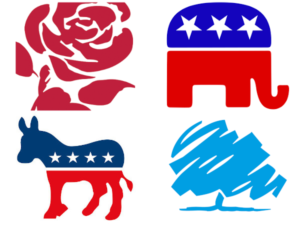 ‘Mutualism’ will supersede traditional left vs right politics
‘Mutualism’ will supersede traditional left vs right politics
 Why Adam Smith, father of capitalism, would have hated neoliberalism
Why Adam Smith, father of capitalism, would have hated neoliberalism
 What are the roots of right and left thinking, and can we unite left and right against corporate power?
What are the roots of right and left thinking, and can we unite left and right against corporate power?
 Is a Permaculture world achievable, and if so, why are we moving in the opposite direction?
Is a Permaculture world achievable, and if so, why are we moving in the opposite direction?
 Low-impact money
Low-impact money
 Commons economy
Commons economy
 Philosophy
Philosophy
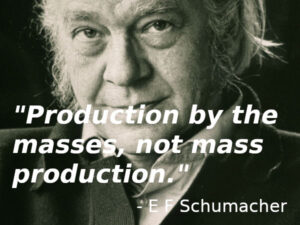 Small is beautiful
Small is beautiful
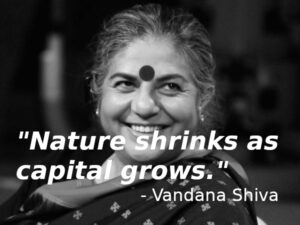 Steady-state economics
Steady-state economics
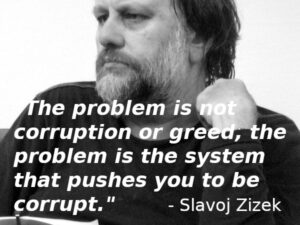 System change
System change
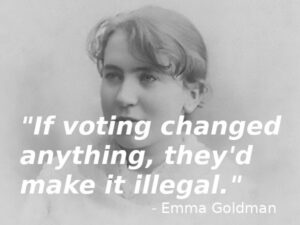 The 'democracy problem'
The 'democracy problem'
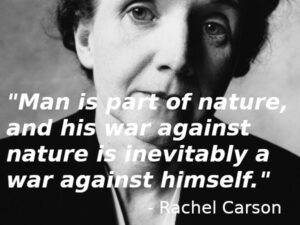 The 'nature problem'
The 'nature problem'


